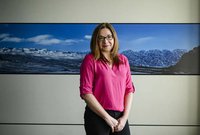Born and raised in Canada, Dr. Hayhoe lives in Lubbock, Tex., where her dual identity as an atmospheric scientist and a practising Christian became an opportunity for bringing the climate conversation to hard-to-reach audiences. A professor of public policy at Texas Tech University and global chief scientist for the environmental organization Nature United, Dr. Hayhoe is the author of Saving Us: A Climate Scientist’s Case for Hope and Healing in a Divided World.
Widely recognized for her public outreach, Dr. Hayhoe was in Toronto last week to receive an honorary degree from Wycliffe College, the University of Toronto’s graduate school of theology, and to deliver the Sunday sermon at Yorkminster Park Baptist Church. She spoke to The Globe and Mail about why tackling climate change begins with dialogue.
You started your academic career studying physics and astronomy at the University of Toronto. What pulled you in that direction?
My dad’s undergraduate degree was also in physics and astronomy. One of my first memories is of him taking me to the park late at night and showing me how to find the Andromeda galaxy through binoculars. Our family vacations were planned around astronomical events, like going to the Outer Banks to see Halley’s Comet. So I loved science and I loved astronomy. I really couldn’t avoid it.
What were you imagining your future would be like back then?
I always thought it would be great to be able to help people. But I thought to do that, you have to be in the medical field, and that didn’t come easily to me at all. What came easily to me was the physics and the math. But it was almost like second-best. Like, if you can’t help people by being a doctor then you can at least contribute to the understanding of science.
When did climate come on your radar?
I needed to take an extra class to finish my breadth requirements. I had already taken children’s literature, I’d already taken the architecture of the Gothic cathedral. So I looked around and there was a brand-new class being offered in the geography department by [atmospheric scientist] Danny Harvey. I took the course and I was completely shocked to find out that climate change was so urgent. I had always sort of mentally lumped it in with other issues that environmentalists care about. If somebody had asked me back then, ‘What’s your perspective on climate change?’ it would be that, you know, David Suzuki’s got it.
How did it affect your career path?
I didn’t have the words back then, but the concept was very clear that climate change is a threat multiplier. That it would take issues of poverty and hunger, lack of access to clean water, basic infrastructure support and health and make them worse. And most importantly, for me, was realizing that it disproportionately affects the poorest and most vulnerable people. I mean, now we know, according to Oxfam, that the poorest 50 per cent of people in the world produce 7 per cent of greenhouse gas emissions. And that’s just not fair. So I thought that, serendipitously, I have the exact skill set that you need to make a difference here. And how can I not?
Read the full interview in the Globe and Mail here:
https://www.theglobeandmail.com/canada/article-interview-katharine-hayhoe-climate-change-religion/

